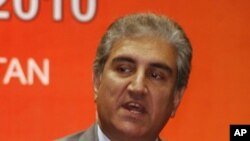A new report released this week says there is clear evidence of direct links between Pakistan's intelligence agency and Taliban fighters in Afghanistan. The report by the London School of Economics asserts that Pakistan's Inter-Services Intelligence agency not only provides funding, training and sanctuary for the Afghan Taliban, but also participates on the movement's main leadership council believed to be in the Pakistani city of Quetta.
The study, based on interviews with nine unnamed Taliban field commanders in Afghanistan, also says Pakistani President Asif Ali Zardari and a senior ISI official allegedly visited some 50 senior Taliban prisoners held at a secret location. The two reportedly told the prisoners that authorities arrested them only because of U.S. pressure and promised their release.
Following the report, the Pakistani government strongly denied its allegations.
Foreign Minister Shah Mehmood Qureshi told reporters the report shortchanges his country's sacrifices. He said Pakistan's troops and intelligence agency have cooperated with their foreign counterparts to combat terrorism, take out militants and suppress the insurgency.
"I think their role has been acknowledged by many in the world. I am quite shocked, seeing this report," said Qureshi.
But Wahid Muzhda, a former Taliban official in Kabul, disagrees.
"This is not a secret because it is very clear the ISI help Taliban, support Taliban" Muzhda said.
But Muzhda is hesitant to agree with the allegations leveled at Pakistani President Asif Ali Zardari, especially considering the report's sources remain anonymous.
Afghan presidential spokesman Wahid Omar said his government always has maintained Taliban sanctuaries, training centers and financial sources are not within Afghanistan.
"They are beyond our borders," Omar said. "And unless that is addressed, war on terror and war against terrorists in Afghanistan will not have the kind of result that we all hope."
Analysts have accused many elements for supporting the insurgency, ranging from those within Pakistan, to Iran, and even terrorist groups with financial ties to the Gulf.
The director of Afghanistan's Center for Research and Policy Studies, Haroun Mir, said if the report is true, its implications could be devastating for the U.S.-Pakistani relationship.
"Pakistanis are directly involved in the killing of American soldiers in Afghanistan," Mir said. "And the U.S. is knowing this, but they are silent about it."
Recently, Pakistan has helped U.S. authorities in arresting a number of Afghan-Taliban militants, including the group's second-in-command, Mullah Baradar, in Karachi. But the Pakistani military mainly focuses its strength on domestic Taliban elements.
Afghan political analyst Akmal Dawi points out that granting Taliban fighters free reign to launch attacks into Afghanistan could help counter Pakistan's biggest threat: India.
"In the long run, what will happen in Afghanistan? Who will take over in Kabul? The Northern Alliance forces are indeed considered by Islamabad as enemy forces very close to Iran and India. And it wants to be prepared for that scenario in the long run," Dawi said.
The U.S.-led coalition dislodged the Taliban with the help of the Northern Alliance in 2001. Since then, the anti-Taliban group has dominated Afghanistan's political landscape.
Analysts believe leaders of the Northern Alliance remain critical of Pakistan for its past support of the Taliban movement.
India is a major donor in Afghanistan, but its relationship with Pakistan has remained tense because of a long-running dispute over Kashmir. The two nuclear powers have fought three wars against each other for control of the mountainous region.
Report Alleging Pakistani Spy Agency's Afghan Taliban Ties Reignites Debate









